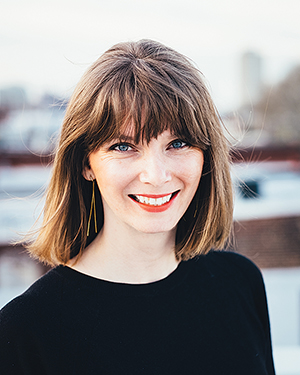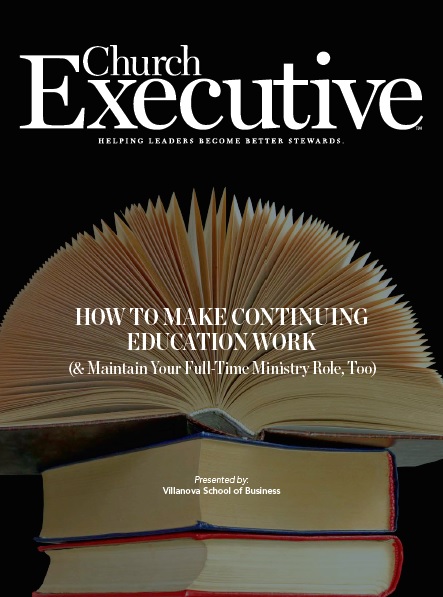
How to make continuing education work
(& maintain your full-time ministry role, too)

Director of the Center for
Church Management
Villanova School of Business
As you look at your current students, how many would you estimate also hold full-time ministry positions?
Chesley Turner: We have a dynamic and diverse group of students in the Master of Science in Church Management (MSCM) program at Villanova School of Business. Currently, 95 percent of our students hold full-time ministry positions. The remaining 5 percent hold full-time jobs outside of faith-based ministry.
As you think about this group of students, are certain areas of focus or study concentrations proving most attractive?
Turner: Students from various backgrounds enroll in the MSCM program because they want to learn how to bridge management and ministry. Some are young, ordained clergy beginning to lead churches. Some, with years of impressive corporate experience, seek to integrate faith and spirituality into what they already know. Some are ministry lifers, looking to enhance how they serve the church.
For all these individuals, time is in short supply. In what ways do you accommodate this challenge?
Turner: We’re all on God’s time. It’s a resource that we steward to better serve the mission and spread the Good News. Improving the operational skills of our ministers ultimately makes more time for them to dedicate to their calling and their gifts.
Still, we provide remarkable flexibility by offering all our courses online, featuring both synchronous and asynchronous instruction. Students can watch asynchronous lessons on their own time and join the class for an hour a week of synchronous class time.
Obviously, COVID-19 has changed the way we do most things. Is the same true for your educational offerings?
Turner: COVID-19 energized the MSCM program, motivating us to create additional opportunities for alumni, students, and experts to connect and discuss how to navigate the pandemic in our ministries. Our program has always been offered online, so instead of focusing energy to pivot how we offer instruction, our students and professors were able to respond to others, helping colleagues learn how to navigate digital platforms and make lesson plans for online learning.
Of course, the cost of pursuing continuing education is also a concern for church leaders — not just now, during the coronavirus pandemic, but in general. How can it be more financially attainable?

Turner: It takes money, time and energy to earn a post-graduate degree. But it’s not a cost, it’s an investment, both in the student and in their organization. That’s why community support is crucial.
At Villanova University, we offer a 25 percent scholarship to any student who is currently working in or for the church, as a sign of our support of their ministry.
Many of our students’ churches subsidize tuition cost as continuing education of their employees. Our own Center for Church Management also offers some scholarship funds for students who demonstrate need, as well.
As online coursework becomes more commonplace, how are you making the learning experience as student-friendly as possible — especially for students in full-time ministry?
Turner: The MSCM program is conducted almost entirely online, bringing together a diverse group of students from around the world, united in the joyful task of growing into the community God has called us to be. The student experience usually starts with a week on Villanova University’s campus, to share in person-to-person fellowship before the remainder of the two-year program is completed online.
This year, we found new ways to build community, with online meetings dedicated exclusively to relationship building and small groups to support one another.
As phenomenal and advanced as online learning is, there’s still a faction of students who believe they learn better in-person. What would you tell them?
Turner: I love to speak with prospective students about the Villanova MSCM experience, because I completed the degree in 2019 while serving as full-time Director of the National Shrine of Saint Rita of Cascia in Philadelphia. Of course you learn differently in person. But the real motivators for successful learning are knowledgeable professors who care about their students and engaged classmates who energize conversation.
And, by learning online, you gain the opportunity to learn from those outside your geographic area. Through this program, I’ve turned classmates into friends that continue to be resources for personal and professional support. From Fr. Joe in Rome to Danna in Alaska, from Kristen at a Baptist church in North Carolina, to Kevin at a Catholic Diocese in Massachusetts. Our program is rooted in the Augustinian tradition of community-building, as a microcosm of the people of God.
— Reporting by RaeAnn Slaybaugh


